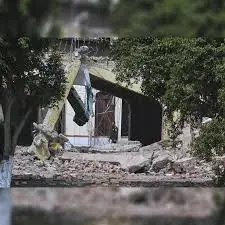‘Air defence system at Lahore neutralised’: Full text of India’s statement after Pakistan attempt to engage military targets

India Neutralizes Pakistan’s Air Defence System in Retaliation to Military Targets Attack
On May 8, 2025, India issued a statement confirming that it had neutralized Pakistan’s air defence system in Lahore after Pakistan attempted to strike multiple Indian military targets. The military engagement took place during the night of May 7-8 and adds to the ongoing tensions between India and Pakistan, particularly over the disputed region of Kashmir. India’s defense response was swift and direct, aiming to counter Pakistan’s missile and drone strikes targeting key Indian military sites.
Pakistan’s Attempted Attack
India’s Ministry of Defence reported that Pakistan launched an attack using drones and missiles. The targets included military installations across northern and western India, such as Awantipura, Srinagar, Jammu, Pathankot, Amritsar, Kapurthala, Jalandhar, Ludhiana, Adampur, Bhatinda, Chandigarh, Nal, Phalodi, Uttarlai, and Bhuj. These locations are crucial to India’s defense infrastructure. Pakistan’s aim was clear: to strike critical installations with missiles and drones. However, India’s military responded rapidly, neutralizing the threats before they could cause any damage.
India’s advanced Integrated Counter Unmanned Aircraft Systems (C-UAS) and air defence systems intercepted the missiles and drones mid-flight. Pakistan’s attempt was thwarted before it could have any significant impact on the targeted sites.
Targeting Lahore’s Air Defence System
One of the significant developments came when India confirmed that it had neutralized Pakistan’s air defence system in Lahore. This action followed Pakistan’s missile and drone operations. By targeting Lahore’s air defence systems, India sent a clear message of its readiness to defend its sovereignty.
The Indian Ministry of Defence emphasized that the retaliation was proportionate. The objective was to protect critical military infrastructure, not escalate the situation. India’s military responded decisively to neutralize the threats posed by Pakistan’s aggression, ensuring that Pakistan understood the consequences of continued hostility.
Proportional Response and Call for De-escalation
India’s statement highlighted that the response was measured and focused on neutralizing the immediate threats. The government made it clear that it did not seek to escalate the conflict but instead aimed to safeguard its borders and military installations. India expressed its willingness to avoid further escalation, provided Pakistan reciprocates with restraint.
India reiterated its commitment to maintaining peace and stability in the region. However, the government warned that any future attempts by Pakistan to target Indian military or civilian infrastructure would be met with similar measures. This warning signaled that India would not hesitate to act decisively to protect its sovereignty.
The Kashmir Issue and Ongoing Tensions
The military exchange is part of the broader, long-standing tensions between India and Pakistan. The Kashmir dispute remains at the heart of the conflict. Since the partition of India and Pakistan in 1947, the region has been a point of contention. Both nations claim Kashmir as their own, with India controlling the largest portion, Pakistan controlling a smaller section, and China holding a part.
In August 2019, India’s revocation of Article 370, which granted special autonomy to Jammu and Kashmir, further inflamed tensions. Pakistan has consistently opposed this move. The recent missile and drone strikes from Pakistan appear to be a continuation of its strategy to pressure India over Kashmir.
India’s response to these provocations reflects its resolve to defend its sovereignty and national security. The message is clear: any attempt to destabilize the region will be met with strong resistance.
International Reactions and the Global Impact
The confrontation between India and Pakistan has drawn significant attention from the international community. Global powers, including the United Nations, the United States, and China, have urged both countries to de-escalate the situation. The risk of full-scale conflict is real, given that both India and Pakistan are nuclear-armed.
The international community remains concerned about the possibility of a larger war in the region. A military escalation could have far-reaching consequences, not just for India and Pakistan but for global stability. Analysts have warned that both countries need to act with caution to avoid a dangerous spiral into open conflict.
Despite these concerns, the situation remains precarious. Both India and Pakistan continue to face internal pressures, and the Kashmir issue remains unresolved. The ongoing military posturing could lead to further skirmishes, heightening tensions and threatening peace.
A Call for Diplomatic Solutions
The conflict between India and Pakistan is not an isolated incident but rather part of a long history of hostilities. Both nations have fought multiple wars and engaged in several military skirmishes over Kashmir. However, military actions alone cannot resolve the underlying issues. Diplomatic efforts are crucial to finding a lasting solution to the Kashmir dispute.
The international community must continue to press both sides to engage in dialogue. A peaceful resolution to the Kashmir issue would not only benefit India and Pakistan but also contribute to regional and global stability. The risk of further military escalation is high, and only through diplomatic engagement can both countries hope to avoid the catastrophic consequences of a full-scale war.
Conclusion: The Path Forward
India’s neutralization of Pakistan’s air defence system in Lahore serves as a stark reminder of the volatility in the region. While India’s response was aimed at neutralizing the immediate threats, it also highlighted the fragile balance between peace and conflict in South Asia.
As tensions remain high, both India and Pakistan must tread carefully. The international community must continue to urge restraint, and both nations must seek ways to engage in constructive dialogue. Only through diplomacy can the ongoing Kashmir dispute be resolved, ensuring a more peaceful future for the region and the world.






